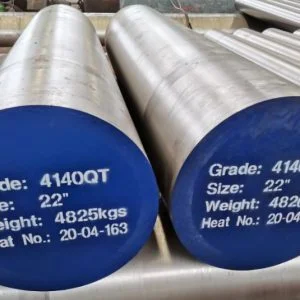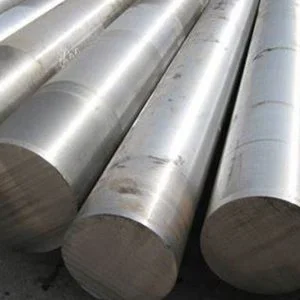Introduction

Alloy steel bars are integral to a wide range of industrial applications, offering unique advantages over conventional steel due to their enhanced properties and performance characteristics. This blog explores the various benefits of alloy steel bars and their specific uses in different industries.
What is Alloy Steel?
Alloy steel is a type of steel that incorporates alloying elements to enhance its mechanical properties such as strength, hardness, toughness, wear resistance, and corrosion resistance. Common alloying elements include chromium, nickel, molybdenum, manganese, and vanadium.
Properties of Alloy Steel Bars
Moreover, alloy steel bars offer exceptional machinability, allowing for precise shaping and finishing during manufacturing processes. This quality is particularly beneficial in industries requiring intricate components with tight tolerances, such as aerospace and precision engineering. Additionally, their resistance to corrosion ensures prolonged durability in challenging environments, making them reliable choices for applications exposed to harsh weather conditions or corrosive substances. The combination of these properties makes alloy steel indispensable in diverse industrial sectors where reliability, performance, and longevity are paramount concerns.
Applications of Alloy Steel Bars
Alloy steel bars find extensive use in industries such as aerospace, automotive, oil and gas, construction, and manufacturing. They are utilized in components such as shafts, gears, bolts, pipelines, and structural supports where high strength and durability are critical.
Advantages of Alloy Steel Bars
Alloy steel bars offer numerous advantages over traditional carbon steel bars:
- Higher Strength: Alloying elements such as chromium, nickel, and molybdenum not only increase the hardness of alloy steel bars but also contribute to their tensile strength, making them ideal for heavy-duty applications such as structural supports in high-rise buildings and offshore platforms. This superior strength allows alloy steel to withstand extreme loads and stresses without deforming or failing prematurely, ensuring reliable performance under challenging conditions.
- Improved Toughness: In addition to their high strength, alloy steels exhibit exceptional toughness due to the fine distribution of alloying elements throughout the microstructure. This microstructural refinement helps absorb energy during impacts, reducing the likelihood of fracture or failure. As a result, alloy steel bars are preferred for critical components in machinery, where resilience against sudden shocks and vibrations is crucial for operational safety and longevity.
- Corrosion Resistance: The presence of alloying elements like chromium in alloy steel forms a protective oxide layer on the surface, which acts as a barrier against corrosive substances such as moisture, chemicals, and salts. This corrosion resistance extends the lifespan of components exposed to harsh environmental conditions, such as marine structures, chemical processing equipment, and automotive parts. Alloy steel’s ability to resist corrosion minimizes maintenance needs and downtime, contributing to overall cost savings and operational efficiency.
- Wear Resistance: Alloy steel are engineered to withstand abrasive wear and frictional forces encountered in industrial settings. The addition of alloying elements like vanadium and tungsten enhances the hardness and wear resistance of the steel, making it suitable for components subject to constant frictional contact, such as gears, bearings, and cutting tools. This increased resistance to wear ensures longer service life and reduces the frequency of replacements and repairs, thereby optimizing production uptime and reducing overall maintenance costs.
Alloy Steel Bar Grades and Specifications
Alloy steel bars are available in various grades and specifications to meet specific application requirements. Table 1 outlines some common alloy steel grades and their properties:
| Grade | Composition (%) | Tensile Strength (MPa) | Yield Strength (MPa) | Applications |
|---|---|---|---|---|
| AISI 4140 | C: 0.38-0.43, Cr: 0.8-1.1 | 655-1030 | 415 | Gears, shafts, automotive parts |
| AISI 4340 | C: 0.38-0.43, Ni: 1.65-2.0 | 745-1030 | 470 | Aircraft components, crankshafts |
| AISI 8620 | C: 0.18-0.23, Ni: 0.4-0.7 | 585-760 | 435 | Gears, couplings, tool holders |
Environmental Impact and Sustainability

Alloy steel bars contribute to sustainability efforts through their durability and recyclability. The longevity of alloy steel components reduces material consumption and waste generation over their lifecycle.
Conclusion
In conclusion, alloy steel bars are indispensable in modern industrial applications due to their superior mechanical properties and versatility. From enhancing strength and durability to providing corrosion resistance and wear protection, alloy steel bars play a crucial role in ensuring reliable and efficient operation across various sectors.
FAQ
Q: What are the main advantages of using alloy steel bars?
A:Alloy steel bars offer higher strength, improved toughness, corrosion resistance, and wear resistance compared to carbon steel bars.
Q: Where are alloy steel commonly used?
A:They are used in aerospace, automotive, oil and gas, and construction industries for components such as shafts, gears, bolts, and pipelines.
Q: How can alloy steel bars contribute to sustainability?
A:Their durability and recyclability reduce material consumption and waste, supporting environmental sustainability efforts.
This blog has highlighted the significance of alloy steel in industrial applications, emphasizing their critical role in advancing technology and improving operational efficiency. Whether in aerospace engineering or construction projects, alloy steel bars continue to set the standard for performance and reliability.
